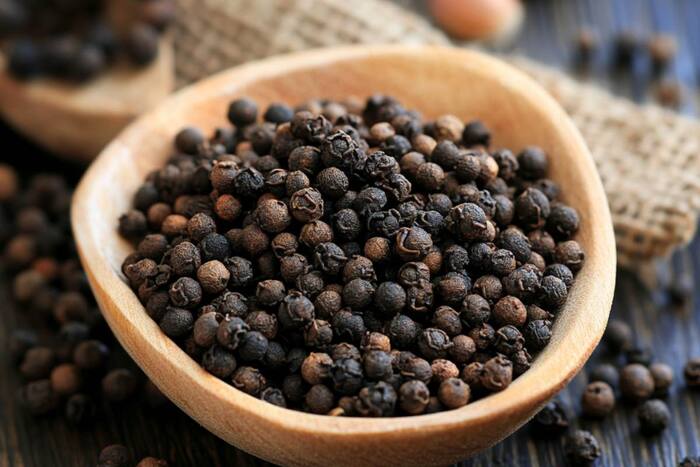Black pepper, a powerful winter spice, is packed with health benefits like boosting immunity, easing digestion, and relieving respiratory problems such as colds and coughs. Its thermogenic properties keep the body warm in cold weather. Piperine, its active compound, improves nutrient absorption and supports weight management. It also has anti-inflammatory effects, alleviating joint pain and stiffness. Black pepper’s antibacterial properties help fight infections, while its antioxidants promote healthy skin. Versatile and beneficial, it’s a must-have for overall wellness in winter.
1. Boosts Immunity
- Black pepper is rich in antioxidants and essential compounds like piperine, which help strengthen the immune system. During winters, when infections like colds and coughs are prevalent, consuming black pepper can provide a protective shield.
2. Provides Natural Warmth
- As a thermogenic spice, black pepper helps generate heat in the body, making it ideal for the cold winter months. Adding it to soups, teas, or stews keeps you warm and prevents chills.
3. Eases Respiratory Issues
- Black pepper acts as an excellent decongestant and expectorant. Its warming nature helps break down mucus, making it easier to expel. It’s especially useful in treating colds, sinusitis, and bronchitis during winter.
4. Aids Digestion
- In winters, the digestive system tends to slow down, leading to indigestion or bloating. Black pepper stimulates the secretion of digestive enzymes, enhancing the digestion process and preventing gastrointestinal discomfort.
5. Relieves Cough and Sore Throat
- Black pepper mixed with honey or in herbal teas is a traditional remedy for soothing sore throats and suppressing persistent coughs. Its anti-inflammatory properties reduce throat irritation effectively.
6. Fights Infections
- The antibacterial and antimicrobial properties of black pepper help combat infections that are common during the winter season. It protects against harmful bacteria and supports overall health.
7. Enhances Nutrient Absorption
- Piperine in black pepper enhances the bioavailability of nutrients such as vitamins and minerals from food. This is particularly beneficial in winters when the body needs more nutrients to stay healthy.
8. Supports Weight Management
- Winters often bring reduced physical activity and increased calorie intake. Black pepper boosts metabolism and promotes fat burning, aiding in maintaining a healthy weight.
9. Reduces Inflammation
- The anti-inflammatory compounds in black pepper help alleviate joint pain and stiffness, which can worsen during cold weather. It is particularly beneficial for those suffering from arthritis or chronic pain.
10. Improves Skin Health
- Winters can lead to dry and dull skin. Black pepper, with its antioxidant properties, fights free radicals and improves blood circulation, promoting healthy and glowing skin.
How to Incorporate Black Pepper in Winters
- Add to soups, stews, and curries for a warm and spicy flavor.
- Sprinkle over salads, roasted vegetables, or eggs.
- Mix with honey and ginger tea to combat coughs and colds.
- Include in marinades or spice rubs for meats and vegetables.
Black pepper is a versatile spice that not only enhances flavor but also provides essential health benefits, especially during winter.



